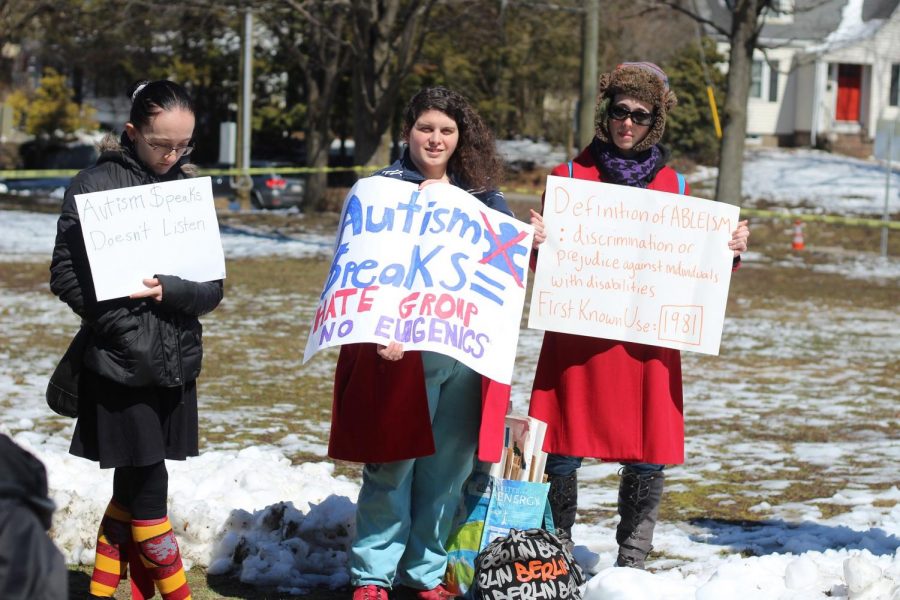A screening and discussion of Erik Linthorst’s 2019 documentary “Autism Goes to College” Monday night ignited debate over the issues faced by college students with autism and other disabilities at schools across the nation.
Led by a panel of University of Massachusetts students and faculty, questions were raised about the film’s representation of student experiences, how they relate to the UMass community and how abled students can best support their disabled peers.
Following a screening of the 65-minute film, the panel agreed that the documentary succeeded in representing diverse perspectives, but that it was too cautious in its message.
“I appreciated that they included both people in four and two year colleges and traditional and non-traditional students in terms of ages,” said Katherine Boukharov, president of the Disability Culture Club and junior auditory perception major. “I wish they had also focused more on the ways in which transitioning into college life is different besides just academic and social aspect.”
Adam Hartwell , who works in human services and was diagnosed with autism in his twenties, added to Boukharov’s concerns.
“I appreciated there was a focus on success, but at the same time, I think that narrative ensures that people are not addressing how to negotiate failure,” said Hartwell.
Hartwell also questioned what the filmmakers might have been leaving out.
“One of the things that we will see in films like the one we just watched is there is a tendency to try to, for lack of a better term, look for, ways to make disability friendly and often times it is to the detriment of the individuals involved,” said Hartwell.
Hartwell pointed to one of the characters followed in the film: an animation major named Jonathan. Jonathan is portrayed as socially awkward, struggling to make connections with various roommates and spending much of his free time making solo trips into the nearby city. Hartwell compared Jonathan’s story to his own experience struggling to make social connections in middle school and said that when he transitioned to college, he found that the diversity of social groups made it much easier for him to find his place.
“I think if this documentary had a little more bravery, it would have taken the time to explore where the social opportunities for the individuals [in the film] were evolving,” he said, suggesting that Jonathan may have been being accepted in other social groups that the filmmakers chose not to portray.
Another important issue that the film touched on was the system of disability services in colleges and universities around the country.
“As someone that is using disability services, I feel like they really don’t do enough to reach out to the students,” said Sam Costa, a psychology major. He specified that it would be beneficial for students with disabilities if schools reached out to them about accommodations instead of leaving it up to the individual.
“Especially for me, at UMass, I feel like if I want the help I need, I need to ask for it. I really need to reach out to professors but not everyone wants to do that,” said Costa.
Costa says that it can be difficult to talk to professors about a disability.
“I would want to disclose to some professors, but not to all. I feel like some professors get it and some don’t,” he said.
Jeffrey Edelstein, a first year Ph.D. student and co-founder of the nonprofit College Autism Network, fielded a question from the audience which brought up the issue of ally-ship and how able students can best support their peers with disabilities.
Edelstein does not have autism, but has a brother who has been diagnosed. He said that being an ally is about being vulnerable and actively working to learn more.
“It is not anyone’s job to educate you about how to be a good ally,” Edelstein explained. Instead, he urged people to check out learning resources on their own such as the Autistic Self Advocacy Network and the Autism Non-Binary Network.
The “Autism Goes to College” screening and discussion was sponsored by the Developmental Disabilities and Human Services Specialization, Student Success, the College of Engineering, Career Services, the Center for Student Success Research and Disability Services.
Editor’s note: A short paragraph of this article was removed for clarity.
Lily Robinson can be reached at [email protected].




















Deanna Yadollahi • May 1, 2020 at 12:42 pm
Hello!
Although many have been using able-bodies/minded or just abled, disability is not synonymous of inability, and the opposite of inability is ability. I propose the use of non-disabled as the opposite of disabled with a note that all people are able to do things functionally even if in different ways, and there’s a distinction between impairment and disability/disablement, but per the social model of disability, the environment disables the person in certain settings that are inaccessible or exclusive to them, and is an identity celebrated by many of blockage or barrier to equal access due to design (lack of universal design and proactively provided access and inclusion). For example, ramps and automatic doors benefit everyone, as do open-note, untimed exams with a larger window to complete them, which prevents the need for retroactive accommodations. Thanks!